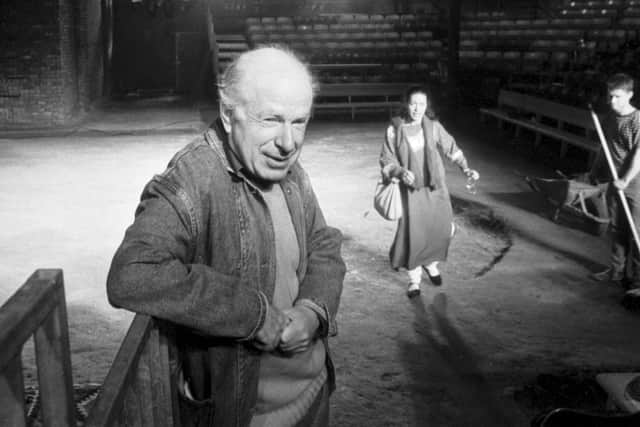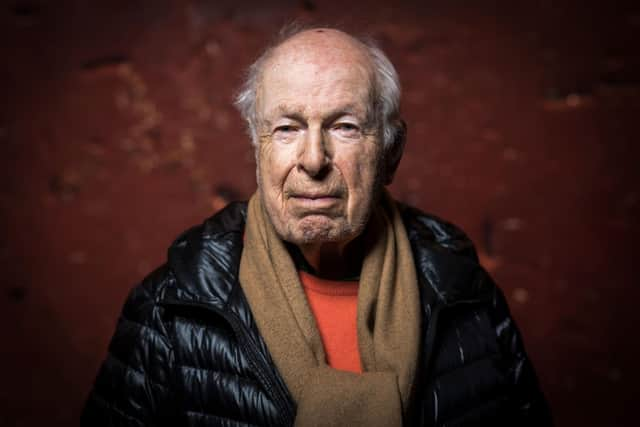Obituaries: Peter Brook, visionary and influential theatre director
Peter Brook, often described as Britain’s greatest living theatre director, has died at the age of 97.
Brook helped to redefine how we view and create theatre.
The legendary Brook, a major theatrical innovator of his generation, had a profound association with Glasgow and Scotland. His epic nine-hour production The Mahabharata was staged in Glasgow in 1988 as a curtain raiser for Glasgow’s year as European City of Culture in 1990. It marked his return to the UK for the first time in 14 years. Brook and Jean-Claude Carrière adapted the world’s longest poem for the theatre, premiered at the Avignon festival in 1985, with a cast drawn from many cultures and theatrical traditions.
Advertisement
Hide AdAdvertisement
Hide Ad

It was this production that created the Tramway on Glasgow’s south side, a 19th century tram shed unused for two years. Although not an obvious choice for Brook’s nine-hour marathon – by then enjoying acclaimed status at the world’s most prestigious festivals – Glasgow’s Cultural Capital of Europe plans were ambitious enough to transform an old industrial building into Scotland’s most flexible performing space. Tramway became a major venue for internaional theatre (the sort only programmed by the Edinburgh International Festival).
It was Brook’s technical director Jean Guy Lecat who recognised the building’s theatrical potential. Brook’s Paris theatre Bouffes du Nord was a dilapidated music hall; Tramway’s performance area and iconic brick wall were an exact replica of the Bouffes and Tramway joined a list of disused spaces all over the world initially converted for Brook’s work, and still in use to this day.
Brook built a long and fruitful relationship with Glasgow and Tramway, which became the natural UK base for all his work. Following The Mahabharata, Tramway co-produced La Tragédie de Carmen, La Tempête, The Man Who…., Impressions de Pelleas, and Oh les beaux jours. Brook’s own comment about Glasgow audiences: “you will never fool them.”


His work and philosophy inspired a whole generation of emerging theatre directors and actors in Scotland: Gerry Mulgrew (Communicado), Cathy Boyd (Cryptic), Tony Graham (TAG and Unicorn), Guy Hollands (Citizens), Hamish Glen (Belgrade), David McVicar (opera director), Angus Farqhuar (NVA). The list goes on.
In 2018, 30 years on from Brook’s first appearance in Glasgow, the Edinburgh International Festival invited Bouffes du Nord to be part of its residency programme that included the production of The Prisoner, co-written and co-directed with Brook’s long-term collaborator Marie-Helene Estienne.
In his early years Brook directed plays at the Birmingham Repertory Theatre, and productions for the Royal Opera House in Covent Garden. In 1955, he became the Co-Artistic Director of the Royal Shakespeare Company. Brook’s productions were seen on Broadway in New York, most notably Marat-Sade, which was a prime example of what Brook called “theatre of disturbance”, and which won the Tony award for the best play in 1966.
His work has toured worldwide, including Europe, North America, Japan and Australia. In 1979, Brook took his international troupe on a visit by Africa, presenting The Conference of the Birds, a play based on a 12th Century Persian poem. Brook staged over 100 productions in his lifetime. He also worked in film and is acclaimed for his adaptation of Lord of the Flies in 1963.
His life was one of continuous learning. The flexible and open working conditions which he sought (in vain) in the UK were finally made available to him in Paris, where he and Micheline Rozan founded the CITC (Centre for International Theatre Creations). CICT attracted the first truly global group of actors whose different languages, skills and cultures created boundary-breaking research, improvisation and performance. Brook often stated that “audiences can see that’s what theatre is about – being together.”
Advertisement
Hide AdAdvertisement
Hide AdBrook was the author of the seminal work The Empty Space: A Book About the Theatre: Deadly, Holy, Rough, Immediate (1968). In the opening, Brook states “I can take any empty space and call it a bare stage. A man walks across this empty space whilst someone else is watching him, and this is all that is need.”
The highly charismatic Brook taught me the importance of “silence” in theatre. “Silence is not a dead, empty, clinical word. When it is there, we’re in it, and it’s full of life.”
In Brook’s memoire Threads of Time (1998), his humility and honesty are ever present. Brook recalls his life. “As I write, I do not feel a compulsion to tell the whole truth. I have no respect at all for the school of biography that believes if every social, historical, and psychological detail is added together, a true portrait of a life appears. Rather, I side with Hamlet when he calls for a flute and cries out against the attempt to sound the mystery of a human being, as though one could know all its holes and stops. What I am trying to weave together as best I can are the threads that have helped to develop my own practical understanding, in the hope that somewhere they may contribute usefully to someone else's experience.”
Brook’s legacy lives on. A game changer in every respect, he created a revolution in how, why, and where the actor performs, and what the audience can expect of theatre. His life’s work was devoted to a creative process with absolute commitment by actors to “the present moment of performance.” Brook's work was not without controversy, but always demonstrated, as he described in The Empty Space, “an act of theatre to be engaged”.
Brook was married to the actor Natasha Parry (who died in 2014 at the age of 84) and had two children. Irina, now a stage director, and Simon, a producer and documentary filmmaker.
OBITUARIES
If you would like to submit an obituary (800-1000 words preferred, with jpeg image), or have a suggestion for a subject, contact [email protected]
SUBSCRIBE
Subscribe at www.scotsman.com/subscriptions
